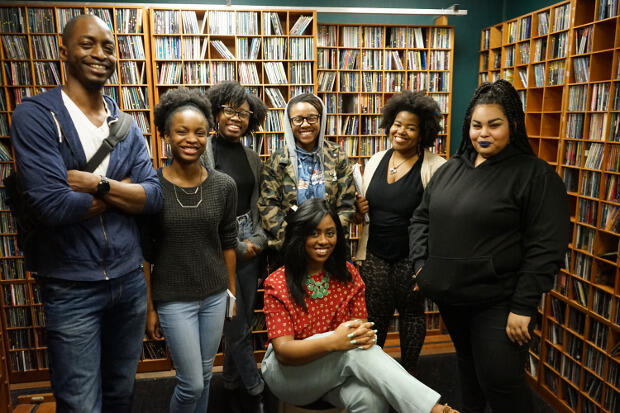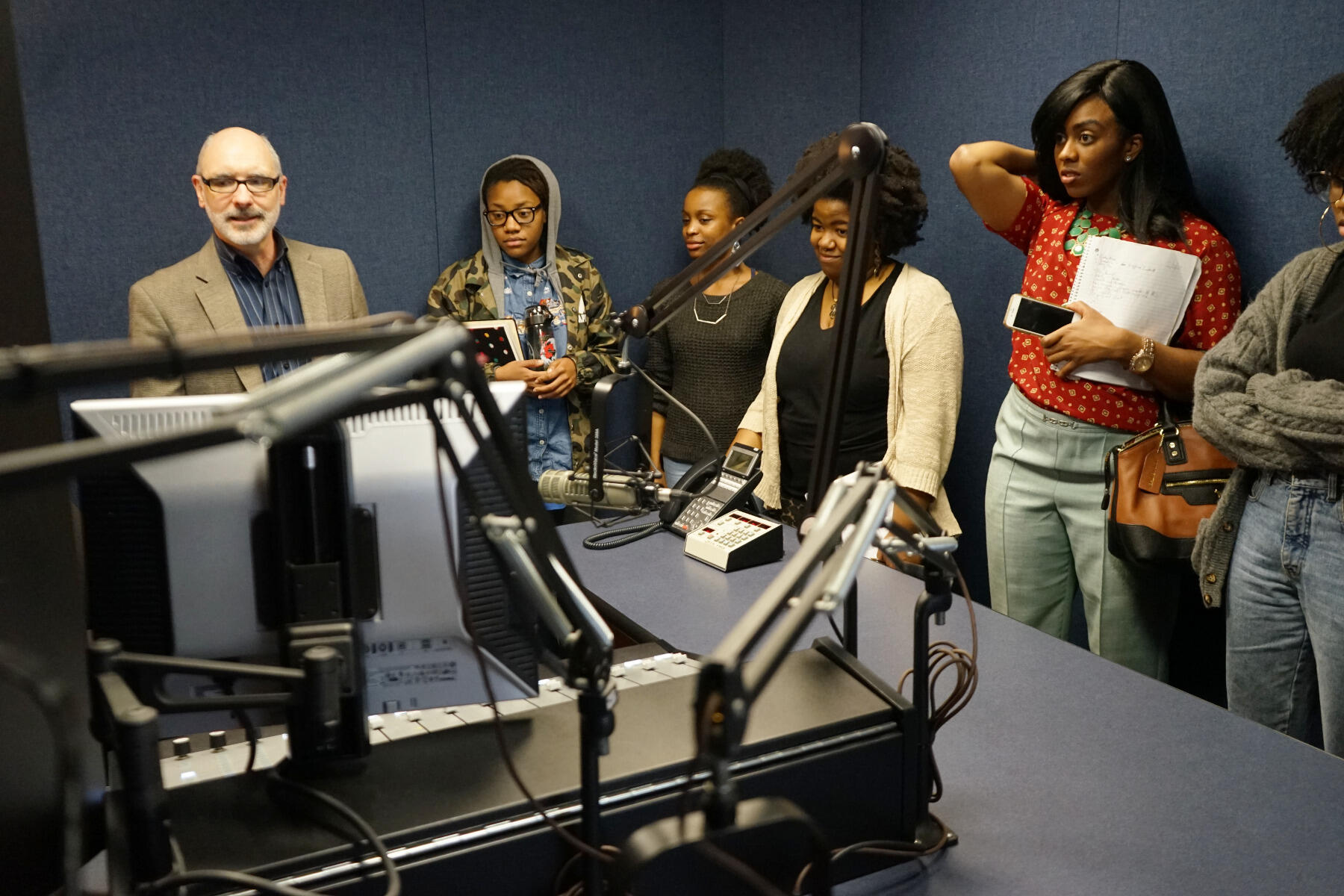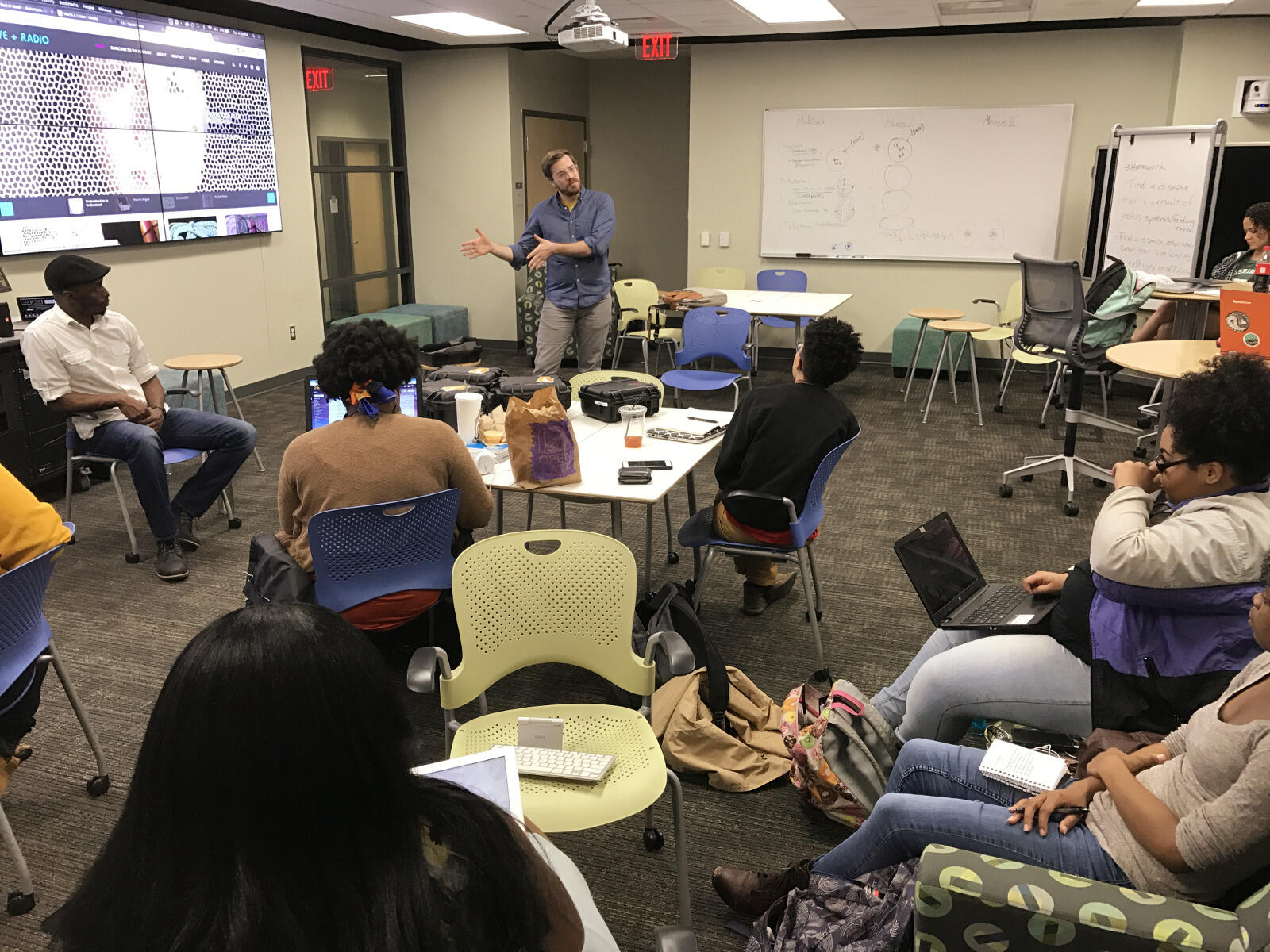
March 6, 2017
In ‘Podcasting While Black’ course, VCU students create podcasts drawing on African-American rhetoric throughout history
Share this story
Reyna Smith, a senior at Virginia Commonwealth University, says she is feeling “lost in the sauce” and in need of feedback as she works to fine tune the concept of her first podcast, “Tea Time in the Shade,” which she’s thinking will likely open up with a rant comparing and contrasting Melania Trump and Michelle Obama.
Chioke I’Anson, Ph.D., an instructor in the Department of African American Studies in the College of Humanities and Sciences and one of NPR’s two voices of underwriting heard on public radio stations across the country, advises Smith that it would be most engaging for listeners if she opens her show with an “organized rant.”
“Start off with, ‘Yo, here’s my rant!’ And then you’re like, ‘Welcome to ‘Tea Time in the Shade,’ and that sets up the whole thing,” I’Anson says. “The thing about ranting is that you miss out on the structure that makes a thing really effective and what you get instead is, like, the crunkness. So, I’m saying, you can have an effective structure, like some Frederick Douglass-type stuff, but your content is Melania Trump vs. Mrs. Obama.”
Smith, who is majoring in African American studies and international social studies, is developing “Tea Time in the Shade” as part of a new African American Studies course called “Podcasting While Black,” in which the students learn critical concepts and rhetorical strategies of great African-American communicators and then incorporate those methods into podcasts exploring the experiences, history and lives of African Americans.
There are all these other mediums in which Africana knowledge, knowledge from the humanities itself, can be spread out.
“One of the dope things about Africana history is that there are all these rhetorical tools that are exemplified in all these figures, whether they be historical or contemporary,” I’Anson said. “So like, people always talk about Socrates and Ovid and these cats, right? And these cats are fantastic. But some of the best manifestations of the Socratic method are found in Martin Luther King. Some of the best manifestations of Ovid’s speech structure is actually in Frederick Douglass. Some of the best ways of articulating our emotional life at all is in Audre Lorde and Toni Morrison. So we need to look at these figures not just to think about what they meant for history, but also to think about what we can learn from them in the ways that they communicated. That can also help us out, and that’s one of the missions of this course.”
The idea of the course is that students learn the basics of podcasting — how to use and maintain recording equipment, how to use digital editing software, how to find their podcast “voice” — and then eventually produce their own podcast pilot that utilizes lessons from Africana history.
“If we think about academic stuff, it takes some really basic forms — it’s a paper, it’s a book, it’s an article, it’s a speech that I gave one time at a banquet. It has a fundamentally dry kind of framework. But that’s not necessary at all,” I’Anson said. “There are all these other mediums in which Africana knowledge, knowledge from the humanities itself, can be spread out: Podcasting, making cool TV shows, being on YouTube. So I wanted to use these different mediums to get students to think critically about the ways that they themselves communicate.”

Workshopping podcast concepts
The students are currently workshopping their podcast ideas, and will record and edit them soon. At the end of the semester, the podcasts will be posted online and will be available for download.
Along with Smith’s “Tea Time in the Shade,” the students’ podcast ideas include one focusing on “blerds,” or black nerds. Another will explore mental health in the African-American community.
Bryce Johnson, a senior political science major, is working on one that will involve him interviewing his childhood best friend who recently came out as gay.
“What I’m going to be doing is talking with him about our past experiences growing up and talking about situations where maybe he felt a little bit uncomfortable and where he was maybe hesitant to come out and say what he really felt because of stereotypical gender norms in the early 2000s and even before then in how we were brought up,” Johnson said. “So I want to dive deep into our past and get a better understanding of how he feels and where we are in terms of moving forward.”
Ashlynn Bell, a junior majoring in African American Studies and Psychology, is working with a classmate on a podcast they’re calling “Memoirs of a Dark Skinned Girl.”
“We want to open it with a letter from a dark-skinned girl, asking for advice and self-love and acceptance in a society where you’re so heavily stigmatized,” Bell said. “And [we’re planning] to have guests on to talk about their experiences as a dark-skinned girl and what they did to overcome challenges that they face. So it wouldn’t be just, ‘Woe is me, listen to our pain.’ It’ll be, what can we practically learn to help people who still need it now? And presented in a way that can be heard by a lot of people.”
At last week’s class, I’Anson advised the “Memoirs of a Dark Skinned Girl” team to avoid being overly general, and to instead to be personal and specific.
“You don’t want to be like, ‘Dark-skin girls have issues,’” he said. “You want to be like, ‘I was 12 and this happened to me.’”
Yet another student, senior English major Lauren Parker, was inspired by WBEZ’s “Making Oprah” podcast, which tells the behind-the-scenes story of the rise of Oprah Winfrey’s TV talk show, and decided to do a podcast on Richmond history.
“I was looking at places that were major sites of Richmond’s slave market or places important to Confederate history. Because those places that don’t seem to have history or don’t seem to impact us now, the different types of sociology in those places are still kind of marked by that history. I was thinking about that, and wanted to put it into a conversation,” Parker said. “I could just research the history myself and talk about it myself, but I think it’s really interesting to see a place that was a major site of the slave market, and to see who’s there today and who’s not?”
Advice from “Love + Radio”
As students arrived at last week’s class, I’Anson played a clip that aired earlier that day on “1A,” a national public radio show and podcast produced by WAMU, in which Lauren Ober, host of WAMU’s and NPR’s “The Big Listen” podcast, described visiting I’Anson’s class and speaking with students about their podcast ideas.
“So, ‘You’re welcome’ is what I’m trying to say,” I’Anson deadpanned to the class. “I’m trying to put you guys in the streets!”
That day’s class featured a guest lecture by Nick van der Kolk, creator and host of the podcast “Love + Radio,” which features “in-depth, otherworldly-produced interviews with an eclectic range of subjects, from the seedy to the sublime” and has been produced since 2005.
“Just so you know,” I’Anson told the students, “we’re now in the presence of a legend who is really deep in the game.”

Van der Kolk shared a few stories behind his podcast’s most famous episodes, including the time he had a gun pointed at him while interviewing a Detroit man who ran a “DIY strip club” out of an old house in residential neighborhood.
Van der Kolk told the class that he likes to explore “morally complicated situations and characters,” including a man who married a doll who was featured on “My Strange Addiction” and an advocate on behalf of registered sex offenders.
“I don’t consider most of our subjects weirdos, except in kind of a delightful way, even if some of them have aspects that might be reprehensible,” he said. “I always have to have a deep sense of empathy for them, while at the same time trying to check myself and come at things from a more objective perspective or ask questions on behalf of the audience.”
I’Anson asked van der Kolk if he had any interviewing secrets he could share with the class as they develop their own podcasts.
I’m often kind of curious why people say yes to being interviewed.
“People want to feel validated,” van der Kolk said. “I’m often kind of curious why people say yes to being interviewed. Unless someone has something like a book to sell or a political agenda, there’s no real reason for them to say yes. And, in fact, if they say something that upsets people, there could be potential consequences for them. So the logical thing, when I come say, ‘Are you interested in an interview?’ is to say no. Not that I feel like I’m an unfair interviewer or anything like that. But it’s really powerful. People need to feel validated and they need to feel like they’re listened to.”
Van der Kolk also gave the students such practical tips as setting up the microphone as close to the interview subject as possible — “If you want that nice, intimate sound, you gotta be right up next to them,” he said, and also to get very familiar with the recording equipment before heading out for an interview.
“You don’t want to be fiddling around with stuff when you show up to interview someone,” he said. “If you show and you’re fumbling with your equipment, that’s going to make your subject feel awkward.”
“A helpful tool to communicate”
A number of the students in “Podcasting While Black” were not very familiar with podcasts before signing up, but they say they are now enthusiastic about the medium.
“I was just really interested in the idea of podcasting,” Johnson said. “I was already into YouTube and I make YouTube videos, so I had already sort of expressed myself through that medium as far as content creation. But I hadn’t really gotten into podcasting. I’d heard a couple of them but I hadn’t taken the time to actually check out podcasting and learn more about it, so I thought it’d be a really good experience.”
Bell said she wanted to take the course because I’Anson is such an engaging professor, but also to give herself communication practice that will come in handy in her future career.
“I struggle with communicating confidently, so I thought this could be a good way to encompass both learning about the history of narratives within the Africana diaspora but also to help myself with communication,” she said. “Since I want to be a therapist, I’m going to have to be comfortable with interviewing people and speaking confidently and clearly.”
“I didn’t listen to podcasts a lot before,” she added. “I didn’t take the class with the aim [of hosting my own podcast] in mind, but now that I know so much about it and it’s such a helpful tool to communicate with a lot of people, I definitely would consider it now.”
Subscribe for free to the VCU News email newsletter at http://newsletter.news.vcu.edu/ and receive a selection of stories, videos, photos, news clips and event listings in your inbox every Monday and Thursday.
Subscribe to VCU News
Subscribe to VCU News at newsletter.vcu.edu and receive a selection of stories, videos, photos, news clips and event listings in your inbox.












